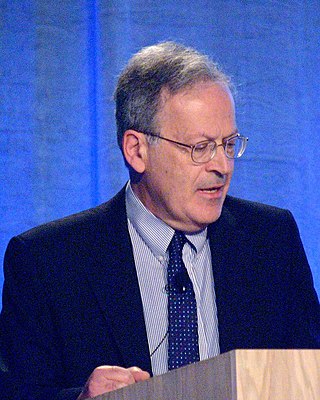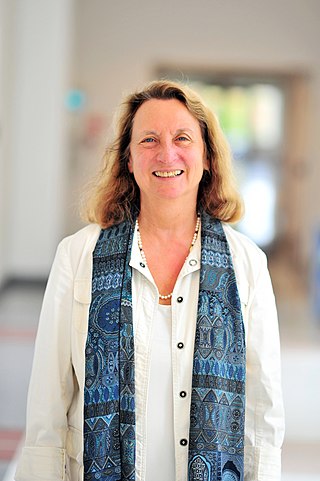Related Research Articles
Nancy Ann Lynch is a computer scientist affiliated with the Massachusetts Institute of Technology. She is the NEC Professor of Software Science and Engineering in the EECS department and heads the "Theory of Distributed Systems" research group at MIT's Computer Science and Artificial Intelligence Laboratory.

Deborah Louise McGuinness is an American computer scientist and researcher at Rensselaer Polytechnic Institute (RPI). She is a professor of Computer, Cognitive and Web Sciences, Industrial and Systems Engineering, and an endowed chair in the Tetherless World Constellation, a multidisciplinary research institution within RPI that focuses on the study of theories, methods and applications of the World Wide Web. Her fields of expertise include interdisciplinary data integration, artificial intelligence, specifically in knowledge representation and reasoning, description logics, the semantic web, explanation, and trust.

Leslie Gabriel Valiant is a British American computer scientist and computational theorist. He was born to a chemical engineer father and a translator mother. He is currently the T. Jefferson Coolidge Professor of Computer Science and Applied Mathematics at Harvard University. Valiant was awarded the Turing Award in 2010, having been described by the A.C.M. as a heroic figure in theoretical computer science and a role model for his courage and creativity in addressing some of the deepest unsolved problems in science; in particular for his "striking combination of depth and breadth".
Anil Nerode is an American mathematician, known for his work in mathematical logic and for his many-decades tenure as a professor at Cornell University.
Richard Earl Fikes is a computer scientist and Professor (Research) Emeritus in the Computer Science department of Stanford University. He is professionally active as a consultant and expert witness. He led Stanford's Knowledge Systems Laboratory from 1991 to 2006, and has held appointments at Berkeley, Carnegie-Mellon, Price Waterhouse Technology Centre, Xerox PARC, and SRI International.

Andrew G. Barto is an American computer scientist, currently Professor Emeritus of computer science at University of Massachusetts Amherst. Barto is best known for his foundational contributions to the field of modern computational reinforcement learning.

Moshe Ya'akov Vardi is an Israeli mathematician and computer scientist. He is the Karen Ostrum George Distinguished Service Professor in Computational Engineering at Rice University, United States. and a faculty advisor for the Ken Kennedy Institute. His interests focus on applications of logic to computer science, including database theory, finite model theory, knowledge of multi-agent systems, computer-aided verification and reasoning, and teaching logic across the curriculum. He is an expert in model checking, constraint satisfaction and database theory, common knowledge (logic), and theoretical computer science.
Vladimir Lifschitz is the Gottesman Family Centennial Professor in Computer Sciences at the University of Texas at Austin. He received a degree in mathematics from the Steklov Institute of Mathematics in Russia in 1971 and emigrated to the United States in 1976. Lifschitz's research interests are in the areas of computational logic and knowledge representation. He is a Fellow of the Association for the Advancement of Artificial Intelligence, the Editor-in-Chief of the ACM Transactions on Computational Logic, and an Editorial Advisor of the journal Theory and Practice of Logic Programming.

Barbara J. Grosz CorrFRSE is an American computer scientist and Higgins Professor of Natural Sciences at Harvard University. She has made seminal contributions to the fields of natural language processing and multi-agent systems. With Alison Simmons, she is co-founder of the Embedded EthiCS programme at Harvard, which embeds ethics lessons into computer science courses.
Radhika Nagpal is an Indian-American computer scientist and researcher in the fields of self-organising computer systems, biologically-inspired robotics, and biological multi-agent systems. She is the Augustine Professor in Engineering in the Departments of Mechanical and Aerospace Engineering and Computer Science at Princeton University. Formerly, she was the Fred Kavli Professor of Computer Science at Harvard University and the Harvard School of Engineering and Applied Sciences. In 2017, Nagpal co-founded a robotics company under the name of Root Robotics. This educational company works to create many different opportunities for those unable to code to learn how.

Elaine Surick Oran is an American physical scientist and is considered a world authority on numerical methods for large-scale simulation of physical systems. She has pioneered computational technology to solve complex reactive flow problems, unifying concepts from science, mathematics, engineering, and computer science in a new methodology. An incredibly diverse range of phenomena can be modeled and better understood using her techniques for numerical simulation of fluid flows, ranging from the tightly grouped movements of fish in Earth's oceans to the explosions of far-flung supernovae in space. Her work has contributed significantly to the advancement of the engineering profession.
Nataša Jonoska is a Macedonian mathematician and professor at the University of South Florida known for her work in DNA computing. Her research is about how biology performs computation, "in particular using formal models such as cellular or other finite types of automata, formal language theory symbolic dynamics, and topological graph theory to describe molecular computation."

Carla Pedro Gomes is a Portuguese-American computer scientist and professor at Cornell University. She is the founding Director of the Institute for Computational Sustainability and is noted for her pioneering work in developing computational methods to address challenges in sustainability. She has conducted research in a variety of areas of artificial intelligence and computer science, including constraint reasoning, mathematical optimization, and randomization techniques for exact search methods, algorithm selection, multi-agent systems, and game theory. Her work in computational sustainability includes ecological conservation, rural resource mapping, and pattern recognition for material science.

Cynthia Diane Rudin is an American computer scientist and statistician specializing in machine learning and known for her work in interpretable machine learning. She is the director of the Interpretable Machine Learning Lab at Duke University, where she is a professor of computer science, electrical and computer engineering, statistical science, and biostatistics and bioinformatics. In 2022, she won the Squirrel AI Award for Artificial Intelligence for the Benefit of Humanity from the Association for the Advancement of Artificial Intelligence (AAAI) for her work on the importance of transparency for AI systems in high-risk domains.
Elaine Chew is an operations researcher and pianist focused on the study of musical structures as they apply to musical performance, composition and cognition, the analysis of electrocardiographic traces of arrhythmia, and digital therapeutics. She is currently Professor of Engineering at King's College London, where she is jointly appointed in the Department of Engineering and the Department of Cardiovascular Imaging in the School of Biomedical Engineering & Imaging Sciences.
Maria Cristina Villalobos is an American applied mathematician at the University of Texas Rio Grande Valley, where she is Myles and Sylvia Aaronson Endowed Professor of mathematics, associate dean of sciences, and director of the Center of Excellence in STEM Education. Her research interests include mathematical optimization, control theory, and their application to retinitis pigmentosa treatment and to antenna design.

Małgorzata Peszyńska is a Polish and American applied mathematician specializing in the mathematical modeling and computational solution of flows through porous media and their geological applications, including the effects of global warming on methane locked in permafrost. She is a professor of mathematics at Oregon State University, on leave as program director for computational and data-enabled science and engineering and computational mathematics at the National Science Foundation.
Barbara Hayes-Roth is an American computer scientist and psychologist whose research in artificial intelligence includes work on knowledge acquisition,[A] automated planning and scheduling,[B] spatial cognition,[C] the blackboard system,[D] adaptation,[E] and intelligent behavior in interactive storytelling.[F] She is a senior research scientist and lecturer in computer science at Stanford University.
Candace Lee (Candy) Sidner is an American computer scientist whose research has applied artificial intelligence and natural language processing to problems in personal information management, intelligent user interfaces, and human–robot interaction. She is a research professor of computer science at the Worcester Polytechnic Institute, and a former president of the Association for Computational Linguistics.
Lynne Edwards Parker is Associate Vice Chancellor and Director of the AI Tennessee Initiative at the University of Tennessee. Previously, she was Deputy United States Chief Technology Officer and Founding Director of the National Artificial Intelligence Initiative Office at the United States' White House Office of Science and Technology Policy. She is an American roboticist specializing in multi-robot systems, swarm robotics, and distributed artificial intelligence.
References
- ↑ Cline, Alan (September 2007), Obituary: Robert Peter Rich , retrieved 2022-06-14
- 1 2 3 Curriculum vitae , retrieved 2022-06-14
- ↑ Elaine Rich at the Mathematics Genealogy Project
- ↑ Elected fellows, Association for the Advancement of Artificial Intelligence, retrieved 2022-06-14